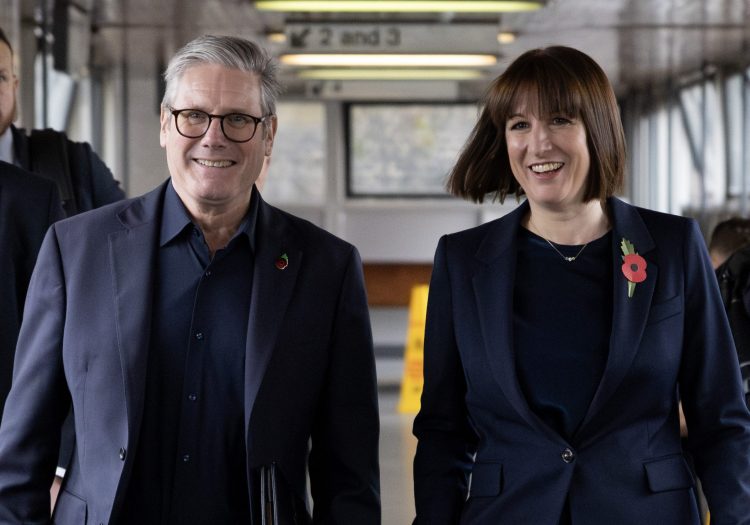LBN speaks to a number of Liverpool city region business leaders about their thoughts on the budget after a few days of reflection and there is cautious optimism – but not everyone is happy. Tony McDonough reports
Prime Minister Sir Keir Starmer and Chancellor Rachel Reeves. Picture by Kirsty O’Connor / Treasury
One of the first cliches heard after every Budget is “the devil is in the detail”.
However, in her first Budget since Labour won the General Election in the summer, Chancellor Rachel Reeves offered plenty of detail. And hikes in national insurance and capital gains tax (CGT) saw a few cheeks puffing in the business world.
We are now a week on from the Budget and people have had a few days to reflect on the medium to long-term implications.
LBN spoke to a number of Liverpool city region business leaders to get their more reflective thoughts. And while there is concern over rises in employer NICs and CGT, there is cautious optimism – although not all are happy.
Overall message seems to be a sigh of relief that after more than a decade of constant change and uncertainty in Government, there are signs that we are about to get a longer period of relative calm and stability.
Under multiple leaders the Conservatives had lurched from one crisis to another and, at times, seemed to be making it up as they went along. Regardless of political ideology, that kind of rollercoaster ride is bad for the economy and bad for business.
Labour secured a thumping parliamentary majority in the summer, albeit with a relatively small popular vote share. They will be in Government for at least the next four years and many people are now prepared to give them time to see what they can do.
In the immediate aftermath of the Budget Greg Johnson, managing director of Bootle window and door manufacturer Warwick North West, did acknowledge the NICs rise posed a challenge for SMEs.
But speaking to LBN this week he remains encouraged by the Government’s commitment to build at least 1.5m new homes during the life of the parliament. But he insisted the approach needed to be right if it was to hit its targets.
“Buy-in from the housebuilding sector, including private developers and housing associations, is critical to the success of the strategy,” explained Greg.
“The Chancellor needs to make good on the pledge. Not only will it lead to greater availability of affordable homes but it will also provide a massive stimulus to the housing sector and its supply chain, which we are part of.”
Warwick is a major supplier to the social and affordable housing sector and Greg says there must also be a commitment to build quality and to thermal efficiency standards that will both reduce fuel poverty and contribute towards net zero targets.
“The Chancellor committed an extra £500m for the Government’s affordable homes programme, which equates to around 5,000 additional social and affordable homes.
“While it is a not insignificant investment, I’m not sure it will bridge the gap between supply and demand. We will need to wait until spring to hear more about future funding.
“The Government keeps talking about a ‘fabric-first’ approach. Around 30% of a home’s heating energy is lost through windows. Quality, efficient windows and doors are a vital component in tackling fuel poverty.
“At Warwick we have invested heavily in the production of windows and doors that meet energy efficient standards, which offers our contractor and developer customers peace of mind and means we play our part in building warm, safe, sustainable homes for the future.
“Here in the city region Metro Mayor Steve Rotheram has shown his commitment to building new affordable homes, particularly on brownfield sites. We fully support that push and call on the Government to give that as much support as possible.”
Greg Johnson, managing director of Warwick North West in Bootle. Picture by Tony McDonough
Anita Spencer, chief business officer at The Sovini Group, which builds, manages and maintains affordable housing, believes the budget puts down a solid marker and provides impetus for it to contribute to building the homes the UK needs.
“We certainly welcome the announcement from the Chancellor that the Government is committing £5bn to deliver the housing plan,” said Anita.
“This includes increasing the Affordable Homes Programme by £3.1bn to unlock housing development across the sector. Further to this, the increase in annual social rents by Consumer Price Index (CPI) +1% over the next five years provides certainty to the market.
“This will enable The Sovini Group to commit to a consistent level of investment in order to build new homes over this period. We offer a full turn-key housing solution, with our integrated end-to-end supply chain.
“This includes the acquisition of land to design and build new homes, combined with the management and maintenance of all types of tenured housing. We as a Group are excited by the opportunities the budget announcement will bring.
“There are already a number of pioneering schemes in our pipeline that are ready to go. Our next step is to continue to engage with Homes England with the aim of securing available grant funding. The group is ready to step up and help meet the country’s urgent housing needs.”
Andrew Dwerryhouse, founder and managing director of Bootle-based brand marketing specialist Wild Thang, acknowledges there were pros and cons from the Budget but said it did at least offer the prospect of a period of stability.
Wild Thang, which provides branded materials to multiple blue-chip clients, has done what Governments always want businesses to do – it has taken calculated risks and invested to create growth and jobs.
Despite the headwinds of the COVID pandemic Andrew and his team pushed on with a £2m-plus investment in its headquarters. It has also established operations overseas in the Republic of Ireland and the US. The firm has also created a number of new jobs.
“Over the past few years, in common with all businesses, we have had to grapple with the rising costs of energy and raw materials,” said Andrew. “Last week’s Budget potentially adds to some of those costs and that is of course a concern.
“However, the constant change and uncertainty from Government over the past decade or so has also made life more difficult for businesses. What we want more than anything is stability and some visibility about what is coming down the line.
“Labour was elected in the summer with a big majority. That means we will have the same Government for the next four years at least and that promises to offer a period of relative stability.
“The message from the Chancellor Rachel Reeves is that the Government will offer a period of consistency that will eventually lead to an upturn in the economy.
“From the point of view of Wild Thang and others in the business community, a period of calm will give us the chance to plan a medium and long-term strategy. It means we can be pro-active rather than reactive.
“But ultimately, Government must deliver on its promises. And in particular we need a firm commitment to sustainability and the fight against climate change. Wild Thang has gone all in on sustainability and we are significantly cutting our carbon footprint.
“It is the right thing to do and, in the long term, it makes sense from a business point of view. But the upfront costs of sustainability, including carbon audits, can be significant and Government needs to support SMEs on this journey.”
Andrew Dwerryhouse, founder of Wild Thang in Bootle. Picture by Tony McDonough
Critical to the growth is the health of the UK’s army of small to medium-sized enterprises. SMEs are the engine for growth. They invest billions of pounds each year and employ tens of millions of people.
Liverpool’s River Capital is an active investor in the North West SME sector, backing multiple businesses with high growth potential. Some in the business world were unhappy with changes in areas such as capital gains tax (CGT).
There is the suggestion that they risk scaring away investors such as high net worth angels.
Marc d’Abbadie, head of venture at River Capital, believes that, compared to other items in the Budget, capital gains tax changes are likely to have a “relatively modest” impact.
“The UK’s CGT rate is still the lowest rate in any European G7 country, although it’s higher than the US and some smaller European economies,” explained Marc. “Entrepreneurs will still benefit from business asset disposal relief, albeit at a slightly higher rate from April
“High net worth individuals investing as angels will still be able to invest under the Enterprise Investment Scheme (EIS) which means that any capital gains from their qualifying angel investments will still be fully exempt from capital gains tax.
“The new CGT rates are likely to make entrepreneurs and investors just marginally more cautious, with the impact felt mainly in already borderline cases.
“For some investors, the increased CGT rates will make CGT-exempt EIS investing more attractive. Overall, I expect entrepreneurs to remain enterprising and investors to continue to invest.”
However, not everyone in the business world was happy with the Budget with many feeling the Chancellor is stifling entrepreneurship and discouraging aspiration.
James Hamilton, founder and managing director of Liverpool IT specialist Halcyon gave a clear voice to that frustration. Fast-growing Halcyon is close to the £1m-a-year turnover and offers a range of outsourced IT services to more than 120 clients.
He wants to invest to grow the business further but believes Rachel Reeves has now made it even more difficult.
“There was much talk after this Government was elected about how they were going to usher in a new era of growth for the UK. But I didn’t see enough of that in Rachel Reeves’s first Budget,” James told LBN.
“It is the job of Government to send a clear message to investors that the UK is an environment where they can flourish. It is the private sector that generates the wealth that pays for the NHS and the schools, the roads, the railways, the public services.
Halcyon founder and director James Hamilton. Picture by Tony McDonough
“From what I can see Rachel Reeves wants to burden entrepreneurs with higher costs and higher taxes. That doesn’t encourage me, it deters me from investing and seriously makes me consider living in the UK and setting up base in somewhere such as Dubai where we already have an office.
“I want to take a risk and invest but why should I do that if that risk is not rewarded because taxes such as Capital Gains are set at a level where they act as a disincentive. I want the option to send my kids to a school of my choice. If I go private I am saving the Government money, yet they want to clobber me with VAT.
“Liverpool is my home city and I want to do well here, to grow my business, create jobs and help other businesses in the supply chain. I feel like Rachel Reeves wants to make it harder for me to do that.”
The post Budget offers hope of stability and more homes appeared first on Liverpool Business News.





